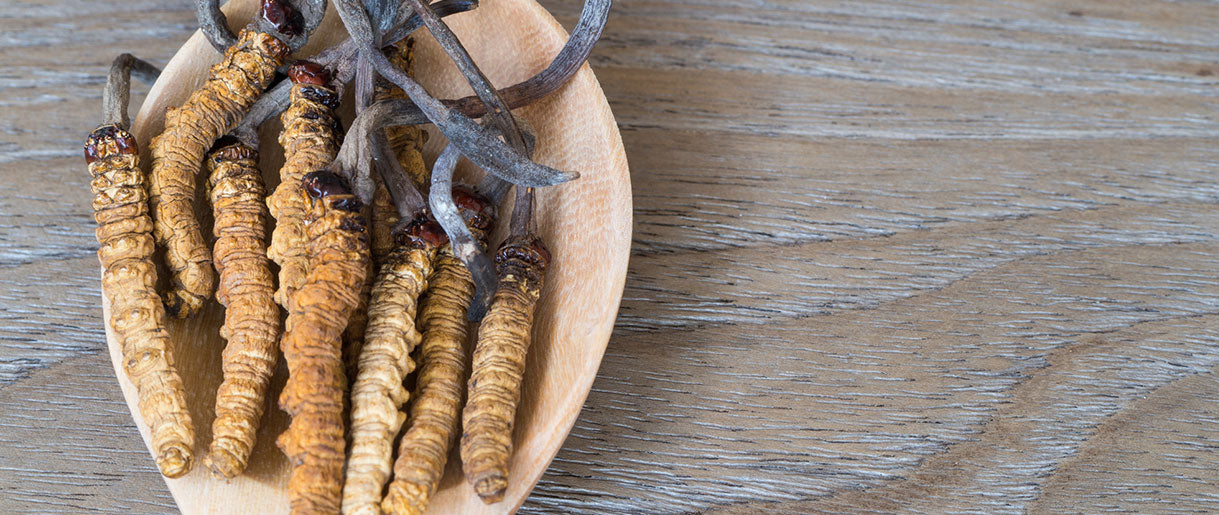In the diverse world of medicinal mushrooms, Cordyceps holds a unique place. It has been used for centuries in traditional medicine, particularly in China and Tibet. It's gained recent popularity in the Western world as an adaptogen—a natural substance considered to help the body adapt to stress and to exert a normalizing effect upon bodily processes. This increased attention has led researchers to uncover more about its potential benefits, particularly regarding sleep.
Taking Cordyceps before bed may offer several potential benefits. This mushroom has also been suggested to improve sleep quality. It is believed to help reduce stress and anxiety, which often interfere with a good night's rest. Furthermore, some research indicates that(1) Cordyceps can help regulate sleep cycles, potentially aiding those struggling with insomnia.
In this article, we'll dive deeper into the world of Cordyceps, shedding light on its history, science-backed benefits, and why it may deserve a place in your bedtime routine. We'll also provide practical tips on choosing the right type of Cordyceps and consuming it for maximum benefits. So, let's embark on this journey to better sleep and overall well-being.
The Fascinating World of Cordyceps

The term 'Cordyceps' comes from the Greek words 'kordyle,' meaning 'club,' and 'ceps,' meaning 'head,' alluding to the unusual shape of these functional mushrooms. The Cordyceps genus is a fascinating group within the larger category of medicinal mushrooms, boasting more than 400 unique species. Two of these have gained substantial recognition in health and wellness circles: Cordyceps sinensis and Cordyceps militaris.
A Glimpse Into the Past: The History and Origin of Cordyceps
Cordyceps sinensis was first documented in traditional Tibetan medicine about a thousand years ago and later in traditional Chinese medicine, known for its incredible healing properties. This particular cordyceps mushroom was only available to the royal family in ancient times due to its rarity and high value. It was traditionally used for many health conditions, from boosting stamina and energy to treating respiratory diseases.
Cordyceps mushrooms are unique in their growth patterns. They are endoparasitoids, which means they grow by parasitizing insects. Once the insect host dies, the mushroom sprouts from the insect's body—an intriguing, albeit somewhat gruesome, part of the lifecycle of these medicinal mushrooms.
Spotlight on Cordyceps Sinensis and Cordyceps Militaris
In modern times, two types of Cordyceps mushrooms have emerged as stars in the wellness field—Cordyceps sinensis and Cordyceps militaris.
Cordyceps sinensis, also known as the caterpillar fungus, is native to the Himalayan region and is known for its high therapeutic value. This medicinal mushroom is highly prized in traditional Chinese medicine for its potent healing properties.
Cordyceps militaris is another vital variety native to many parts of the world. It's become popular due to its ability to be cultivated sustainably and reliably than Cordyceps sinensis, which has been over-harvested in the wild.
Both types of cordyceps mushrooms contain valuable bioactive components that are believed to offer various health benefits. This has led to their growing prominence in functional foods and dietary supplements. From traditional remedies to modern wellness practices, Cordyceps remain prominent among the world's medicinal mushrooms.
Breaking Down the Elements: Active Components of Cordyceps

The Cordyceps mushroom is an impressive natural pharmacy packed with numerous bioactive compounds. Two key constituents have drawn the attention of scientists and health enthusiasts alike: cordycepin and adenosine.
Cordycepin, or 3'-deoxyadenosine, is a unique compound in high concentrations in Cordyceps, especially in Cordyceps militaris. This nucleoside analog has demonstrated potential benefits ranging from the anti-cancer benefits of cordyceps mushroom to anti-inflammatory effects. It's also believed to significantly impact the body's stress response, helping regulate various physiological functions.
Adenosine is another essential component of Cordyceps. Adenosine is a nucleoside and a crucial part of ATP (adenosine triphosphate), the primary energy source for cellular functions. It also plays an integral role in numerous biochemical processes, promoting sleep and relaxation.
These active ingredients, alongside a suite of polysaccharides, sterols, and other compounds, contribute to the potential health benefits of Cordyceps.
Unfolding the Magic: How Cordyceps Function in the Body
The way Cordyceps function in the body is still a subject of ongoing research, but the existing findings are quite promising.
The presence of cordycepin and adenosine may help the body respond better to stress by supporting the adrenal glands and balancing the output of cortisol, the body's primary stress hormone. For these reasons, Cordyceps is classified as an adaptogen that helps the body maintain homeostasis when encountering physical or mental stress.
In addition to managing stress, the compounds found in Cordyceps help in energy metabolism. By supporting the synthesis of ATP—the body's primary energy currency—, Cordyceps may help enhance physical performance and fight fatigue.
Interestingly, adenosine is also involved in sleep regulation. It gradually accumulates in the brain during wakefulness and can promote sleep onset when levels are high. This mechanism could explain why taking Cordyceps before bed may help improve sleep quality.
Moreover, the immunomodulatory effects of Cordyceps can be attributed to its polysaccharide content. These long-chain carbohydrates can interact with the immune system, potentially enhancing its function and promoting overall health.
Unveiling the Evidence: Scientific Research on Cordyceps
Modern science has embarked on a journey to unravel the health benefits of Cordyceps, uncovering evidence that aligns with many of its traditional uses. Research shows that Cordyceps offers many benefits, from immune system enhancement to anti-aging properties.
Bolstering the Body's Defenses: Cordyceps and Immune System Enhancement
One of the key health benefits of Cordyceps lies in its potential to support the immune system. Studies have shown that(2) the polysaccharides and other compounds in Cordyceps can modulate immune responses, leading to a more balanced immune system. This immune system support can play a role in managing inflammation-related illnesses, positioning Cordyceps as a potential natural anti-inflammatory solution.
The Fountain of Youth: Anti-Aging Properties of Cordyceps
Cordyceps also possess potent anti-aging properties. They work by managing inflammation and oxidative stress, which are key contributors to aging. They also stimulate the circulation of oxygenated blood, aiding overall vitality and youthfulness.
Powering Up: Energy and Stamina Boost from Cordyceps
The unique compounds in Cordyceps also have a role to play in energy metabolism. By supporting the production of ATP—the energy currency of our cells—Cordyceps may help boost physical stamina and reduce fatigue, particularly in cases of chronic stress.
Breathing Easy: Cordyceps and Lung Health Benefits
In traditional Chinese medicine, Cordyceps has been used for lung health and respiratory conditions, and current research(3) seems to validate this. Its immune-modulating effects and natural anti-inflammatory properties can support lung health and respiratory function.
The Sleep Connection: Cordyceps and Restful Sleep

The benefits of Cordyceps extend to promoting a good night's sleep too. Research suggests its adaptogenic properties may help combat sleep deprivation and address various sleep disorders by regulating the central nervous system. By supporting a natural sleep cycle, Cordyceps can contribute to achieving restful and restorative sleep.
A comparison to other medicinal mushrooms like Reishi and Lion's mane shows a similar pattern. Just like Reishi, known for its calming effects and sleep support, Cordyceps can aid in achieving a good night's sleep. And akin to Lion's mane, which is celebrated for its mental health benefits and potential neuroprotective properties, Cordyceps also seems to have beneficial effects on the brain and central nervous system.
Interestingly, Cordyceps, Lion's mane, and Reishi mushrooms all appear to contribute to a deeper sleep cycle, helping individuals not only fall asleep but also stay in a deep sleep for longer. This deep sleep phase is crucial for the body to restore and heal itself, further enhancing the immune system and mental well-being.
From Dusk Till Dawn: How Cordyceps Can Improve Sleep Quality
One of the key potential benefits of taking Cordyceps before bed lies in its potential to improve the quality of your sleep. By enhancing the body's natural sleep cycle, Cordyceps may help you fall asleep faster and maintain more profound and restful Non-REM (NREM) sleep.
NREM sleep, or non-rapid eye movement sleep, is a crucial sleep phase for the human body. During this period of increased NREM sleep, the body undergoes most of its restoration and recovery. This is why, for anyone suffering from sleep deprivation or poor sleep, introducing Cordyceps into their nighttime routine could potentially result in sweet dreams and more rejuvenated mornings.
Stress Less: Cordyceps and Anxiety Reduction
Cordyceps mushrooms may reduce anxiety and stress, adding to the potential anti-anxiety health benefits. By modulating the body's response to stress, these mushrooms might help alleviate symptoms of adrenal fatigue, brain fog, and other stress-induced conditions. This calming effect could improve sleep quality, as a relaxed state of mind is vital to falling asleep quickly and achieving deep, natural sleep.
Syncing with the Sun: Cordyceps and Circadian Rhythm Regulation
Your body's internal clock, or circadian rhythm, regulates your sleep-wake cycles. It's a finely tuned system that, when disrupted, can lead to a host of sleep disorders. Emerging research suggests that Cordyceps may help restore balance to your circadian rhythm, synchronizing your body clock with the natural rise and fall of the sun.
By doing so, Cordyceps may help align your sleep-wake cycle more closely with daylight and darkness, potentially reducing instances of wakefulness during the night and promoting more restful sleep.
A Natural Aid for Insomnia: Could Cordyceps be the Answer?
Insomnia, characterized by difficulty falling or staying asleep, is a common sleep disorder that can significantly disrupt a person's life. Cordyceps could be a promising natural aid for people suffering from insomnia and other sleep disorders by improving sleep quality, reducing anxiety, and restoring balance to the sleep-wake cycles. While research in sleep-disturbed subjects is ongoing, the existing evidence indicates the potential for Cordyceps to foster a better night's sleep.
Timing it Right: Ideal Times to Take Cordyceps

Cordyceps can be taken at any time of the day; however, based on its potential ability to help you sleep, it can be beneficial in the evening or just before bedtime. This allows the natural supplements to work with your body's circadian rhythm, potentially aiding sleep onset and improving sleep quality. Our detailed guide on the best time to take cordyceps takes a deeper look at when to take this mushroom.
Your Choice of Chalice: Different Forms of Cordyceps
Cordyceps come in various forms, offering a range of choices to fit your lifestyle and preferences best.
- Cordyceps Powder: Easy to incorporate into your diet, cordyceps mushroom powder can be added to smoothies, cooking, or even making mushroom coffee for a calming evening brew.
- Cordyceps Capsules: For those who prefer convenience, cordyceps capsules are famous. They are easy to take, especially for those who are on the go or have a busy schedule.
- Cordyceps Tea: This form combines the benefits of cordyceps and the soothing nature of tea. Cordyceps tea can make for a relaxing bedtime ritual, aiding in winding down your day.
- Cordyceps Extract: Cordyceps extract, often found in liquid form, provides a highly concentrated dose of the active compounds in the mushroom.
Shopping Smart: Choosing Quality Cordyceps Supplements
When shopping for mushroom supplements, a few things must be considered to ensure a quality product. Look for a product that contains cordyceps extract from a reputable brand, as the extract typically provides a more concentrated source of the mushroom's beneficial compounds.
Opt for supplements that are third-party tested to ensure purity and potency. Also, try to find a product that specifies the source of the cordyceps, as certain types (like Cordyceps sinensis and Cordyceps militaris) are known to have more potent health benefits.
Safety First: Measures and Potential Side Effects
Cordyceps are generally considered safe for most people when taken appropriately. However, as with any supplement, it's essential to talk to a healthcare provider before taking cordyceps, especially if you are pregnant, nursing, or have any pre-existing health conditions.
Possible side effects from cordyceps are rare but may include mild gastrointestinal discomfort. In rare cases, Cordyceps might slow blood clotting, so individuals with bleeding disorders or those taking anticoagulants should use caution.
FAQs About Taking Cordyceps Before Bed
Will Cordyceps Keep Me Awake At Night?
Cordyceps is known for its adaptogenic properties, meaning it helps the body respond to various stresses and maintain balance. While it can potentially increase energy levels, it's unlikely to keep you awake at night when consumed in regular, appropriate doses. Some people find that taking cordyceps in the evening can improve their sleep quality due to its potential stress-reducing and sleep-promoting properties.
However, individual responses to supplements can vary, and what works for one person might not work for another. Therefore, starting with a small dose is essential to see how your body reacts and consult a healthcare provider before starting any new supplement regimen. If you find that cordyceps negatively impacts your sleep, you may want to adjust your dose's timing or consult a healthcare provider.
How To Take Cordyceps For Insomnia Before Bed?
Taking the supplement in the evening or a few hours before bed is typically recommended when using cordyceps for insomnia or sleep quality. This allows the cordyceps enough time to exert their potential calming and sleep-promoting effects on the body.
The dose can depend on the form of cordyceps you're using:
- Cordyceps Powder: If using a powdered form, consider adding a teaspoon to a warm, non-caffeinated drink like herbal tea or warm milk. This can create a soothing pre-bedtime ritual.
- Cordyceps Capsules or Tablets: Follow the dosage instructions on the product packaging. Generally, taking one or two capsules with a glass of water is advised.
- Cordyceps Tea: Brew a cup according to the package directions. Drinking this a couple of hours before bed can be beneficial.
- Cordyceps Extract: The typical dose of a liquid extract is a few drops mixed into a drink. Ensure to follow the specific product's dosing instructions.
Remember, everyone's body reacts differently to supplements, so starting with a smaller dose and monitoring your body's response is essential. It might also take some time to notice any benefits to your sleep, so be patient.
Key Takeaways
Taking cordyceps before bed can offer several benefits to improve overall sleep quality. From its role in reducing stress and anxiety to its possible effects on enhancing our body's sleep-wake cycles, cordyceps offer a natural way to promote restful, rejuvenating sleep. It may also aid those struggling with sleep disorders like insomnia, promising a more balanced and peaceful night.
Incorporating cordyceps into your nightly routine could make a considerable difference if you're seeking a holistic approach to better sleep. As with all natural supplements, the effects may not be immediate, but with patience and regularity, you might find yourself experiencing deeper sleep and waking up more refreshed.
We'd love to hear about your experiences and thoughts on cordyceps. Have you tried it before? Are you considering incorporating it into your routine? Leave a comment below and join the discussion. After all, a good night's sleep is something we all deserve. And if cordyceps can help us get there, it's worth exploring. Sweet dreams!
References
- Cordycepin Increases Nonrapid Eye Movement Sleep via Adenosine Receptors in Rats, (1)https://pubmed.ncbi.nlm.nih.gov/23710239/
- Trends in the Immunomodulatory Effects of Cordyceps militaris: Total Extracts, Polysaccharides and Cordycepin, (2)https://www.ncbi.nlm.nih.gov/pmc/articles/PMC7735063/
- Cordyceps sinensis inhibits airway remodeling in rats with chronic obstructive pulmonary disease, (3)https://www.ncbi.nlm.nih.gov/pmc/articles/PMC5795554/










Let Us Know Your Comments